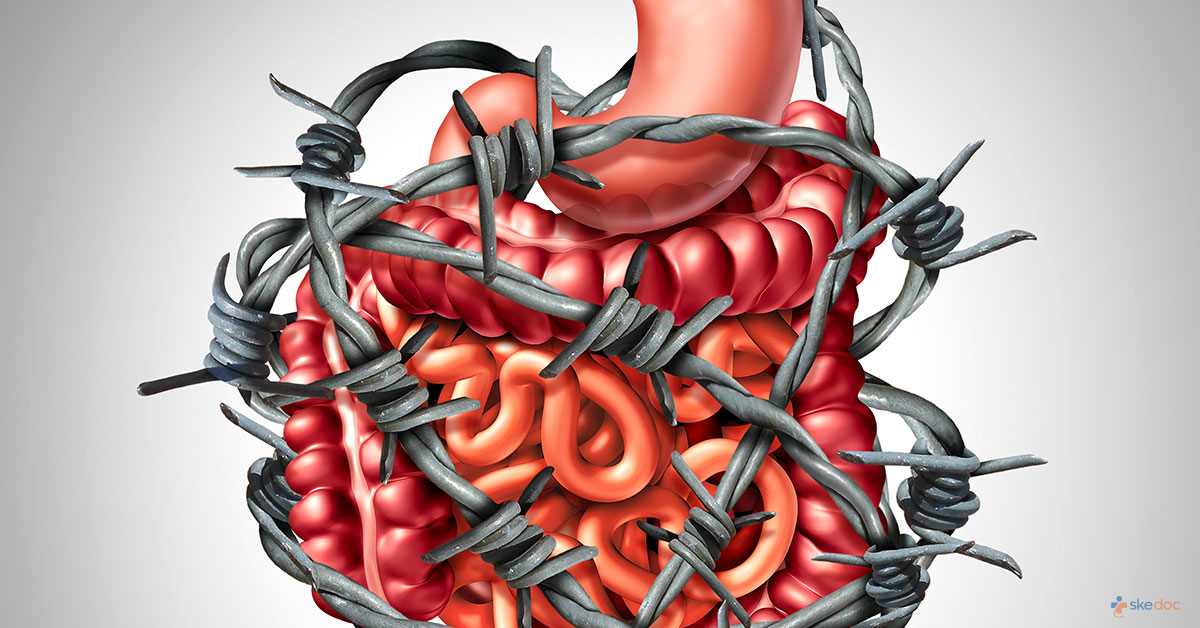Allergy
Blood Diseases
Bone & Joints
Brain
Cancer
Child Care
Cosmetic Surgery
Diabetes
Endocrinology
ENT
Eye
Gen Medicine
General Surgery
Heart
Kidney
Lifestyle
Liver & Digestive
Lung
Men’s Health
Mental health
Physiotherapy
Rheumatology
Skin and hair
Sleep Disorders
Spine
Transplant
Women Health
Thyroid
Vascular Surgery
Irritable Bowel Syndrome

What is Irritable Bowel Syndrome (IBS)?
Irritable Bowel Syndrome (IBS) is a disorder of the gastrointestinal tract that is characterized by the presence of abdominal pain, altered bowel habits and the absence of any specific or unique pathological cause.
Is IBS condition a Medical emergency?
Irritable Bowel Syndrome is not a medical emergency.
Types
The following are the main types of IBS based on the type of bowel movement.
- IBS –D: Diarrhoea is common
- IBS – C: Constipation is common
- IBS – M: There is a mix of both diarrhoea and constipation with an alternation between them
- IBS – U: Neither diarrhoea nor constipation is common
Causes
The exact cause is not known, but the following factors can be responsible for the development of the condition:
- Altered large intestine motility: Rapid contraction and motility of the colon can cause diarrhoea, while slow contraction and motility can cause constipation
- Post Infectious: Infections such as gastroenteritis can contribute to increased contraction and motility of the colon, a change in the neurological signals, and immune response-related changes in the colon
- Neurological causes: Abnormalities of the limbic system and the hypothalamic-pituitary axis may be present, both of which play a role in bowel movements
- Intestinal permeability
- Dietary intolerance
- Changes in the normal flora that is present in the large intestine
Risk factors
The following are some of the risk factors for Irritable Bowel Syndrome:
- Age: Younger individuals (<50 years) are more affected
- Gender: Women tend to be more affected
- Family history of Irritable Bowel Syndrome
- Mental Health issues such as anxiety, depression
Triggering factors
The following may trigger IBS:
- Food allergies
- Stress
- Hormonal Changes
Symptoms & signs
The following symptoms and signs may be seen in Irritable Bowel Syndrome:
- Altered bowel habits: The following singly or in combination may be present
- Constipation with infrequent and/or painful defecation
- Diarrhoea: Small low volume loose stool, with urgency and/or frequent defecation
- Post meal urgency
- Abdominal pain: Diffuse abdominal pain, mostly on the left side, and may be precipitated by meals
- Bloating and distension of the abdomen and gas
- White or mucus discharge may be present in the stool
Investigations
The following investigations may be done:
- Laboratory tests:
- CBP & ESR
- C-reactive protein
- Complete metabolic panel
- Stool examination: For ova and pathogens, enteric parasites, leukocytes, and clostridium difficile toxin
- Liver function tests
- Lactose intolerance test
- Thyroid function tests
- Hydrogen breath test
- Imaging studies:
- Ultrasound – gall bladder: If there is a history of pain in the upper abdomen, specifically related to meals
- CT/MRI – abdomen
- Diagnostic procedures:
- Anal manometry
- Esophagogastroduodenoscopy: If required
- Colonoscopy: If required
Diagnosis
A diagnosis is established based on medical history, clinical evaluation, and results of the investigations done. For confirmation of the diagnosis of Irritable Bowel Syndrome according to the ROME criteria, an individual needs to have had recurrent abdominal pain on average at least 1 day a week for the previous 3 months with at least 2 or more of the following:
- Pain is associated with defecation
- Pain is associated with a change in stool frequency
- Pain is associated with a change in the form or appearance of stool
Treatment options
Management of Irritable Bowel Syndrome consists primarily of recommending dietary measures and providing psychological support, in addition to basic medical management.
Medical management
Medical management of IBS may include the following:
- IBS agents: Such as Linaclotide, Lubiprostone, Plecanatide, AlosetronEluxadoline, etc;
- Antispasmodic agents: Help to relieve the symptoms of intestinal spasms
- Antidiarrheals: Help in the management of diarrhoea
- Tricyclic antidepressants: Help in the management of pain and depression
- Antibiotics: Such as Rifaximin, help prevent overgrowth of intestinal bacteria
- Bulk-forming laxatives: Useful in the management of constipation
Role of Diet/ Exercise/ Lifestyle changes/ Preventive measures
Some measures that can be taken to help manage the symptoms of Irritable Bowel Syndrome may include:
- Dietary Measures: With the help of a dietician,
- Eating at regular intervals
- Fibre supplementation
- Avoidance of foods with FODMAPS ( Fermentable Oligosaccharides, disaccharides, monosaccharides, and polyols)
- Probiotics
- Identifying and avoiding problem foods
- Psychological therapy
Some other measures and lifestyle modifications that can help with the management of IBS may include:
- Avoiding the consumption of caffeine
- Avoiding legumes
- Avoiding Gluten, lactose and fructose-rich foods – in individuals with an intolerance to these
- Judiciously drinking the appropriate amount of fluids
- Exercising and maintaining a healthy lifestyle
- Getting proper rest and sleep
- Avoiding stress and anxiety
Complications
Some of the complications that may be associated include:
- Haemorrhoids
- Increased risk of ectopic pregnancy and miscarriage
- Reduced quality of life
- Mood disorders
Prognosis
The prognosis of Irritable Bowel Syndrome varies from individual to individual, and since it is a long term relapsing disorder, it affects the quality of life. There is, however, no increased risk of cancer, inflammatory bowel disorders, or mortality due to this condition.
When to contact the doctor or hospital?/ How to identify the emergency or complications?
It is advisable to seek medical attention if the symptoms and signs of Irritable Bowel Syndrome are noticed. Immediate medical attention may be required if the symptoms include bleeding, persistent pain, weight loss, vomiting, or anaemia.
Indications for hospitalization if required
Hospitalization is not required for the management of Irritable Bowel Syndrome.
Suggested clinical specialist/ Department to consult for this condition
Specialists from the Department of Gastroenterology will attend to Irritable Bowel Syndrome.
Was this article helpful?
YesNo




